Lou /// they/themtrying to manage lifeart/fashion/studying/knittingGerman: C2English: C2French: C2❁❁❁❁❁❁
Don't wanna be here? Send us removal request.
Text

Books May 2
I’m going to be negative here - maybe because I truly disliked almost everything I’ve read, maybe because I’ve been very critical of things lately. Maybe it’s because I’m training my critical eye, who knows.
Rabea Edel - Portrait meiner Mutter mit Geistern
I finished this book pretty much sitting in front of the library just before returning it. Until the very end, I wasn’t sure if I wanted to finish it - I’m happy that I did, but I don’t think it was worth it. Portrait meiner Mutter in Geistern is a novel that follows women from three generations of a family through their childhood until their early adulthood. The main character is the youngest, and is trying to figure out her mother’s past and who her father is. Bits and pieces of the past are unveiled every chapter, but it takes long until the puzzle pieces start to come together.
I’ve read a review that said there’s a repeating pattern of absence of men in each of the generations of women. However, what is really absent in the book is female friendship. The relationships between women that are shown in the book are largely each of the characters often strained and complicated relationship to their mother. I really liked the writing style, and I enjoyed how the stories are revealed little by little - while a lot stays hidden until the very end too.
NoViolet Bulawayo - Glory
An African retelling of Animal Farm, set in the fictional country of Jidada. NoViolet Bulawayo has originally set out to write about the political situation in Zimbabwe, her home country, but decided to rewrite it as a fable. I think this is quite noticeable in some sections. Animal Farm is already stretching the meaning of a fable quite far, and in this point, it starts to fall apart - to replace hands with hooves and skin with fur and person with animal, while the plot and action largely stays the same.
I really enjoyed her debut novel “We Need New Names” when I’ve read it in high school, but Glory was a bit of a disappointment. The plot line from the synopsis only really starts halfway through the book, and everything before that (and a lot of things after that) is exposition and so so so so much repetition. Bulawayo’s writing style is quite child-like and the immaturity that the repetition of words conveys, combined with the format of a fable cheapens the often violent and brutal reality depicted. A book that is better to write than to read.
Anne Stern - Wenn Die Tage Länger Werden
This is a book of many topics - mother hood, family history, antiquities stolen by nazis, friendship, illness… and none of them have been done particularly well. The novel follows a woman in her late 30s who is, for the first time since the birth of her son, all alone. Her son spends time with his dad, and she has time to discover herself, and uncovers the secrets of her families past - her grandfather was part of the SS, and it turns out that her violin she inherited from him through her mother has been stolen in the 1930s from an antiquity store owned by a Jewish family. The main character is conflicted about it and decides to donate the violin to an orchestra project that uses instruments with a history tied to war.
What I can say is that I liked the writing style a lot, and it’s close to how I like to write (in German - every language is different!). The story itself is a bit disappointing. From the blurb on the back, I expected a story about friendship between two women - that only really started showing in the last few pages of the book, and with little to no build up. The entire arc about the violin and how it relates to her families ties to the SS falls short in multiple ways, but not in unexpected ones. It made me uncomfortable how Stern portrayed the various German characters almost as victims, while the only Jewish character of the story - a descendant of the previous owners of the violin - gracefully absolves them.
Thomas Vaucher - Das Lied der Macht 3
I don’t think I have much left to say about this - It’s a good, enjoyable book, the end of a trilogy. I think it wraps up quite nicely, and even though some of it is quite formulaic - the evil is defeated in the end etc., there’s enough twist and turns to make it entertaining, and there’s enough tension to keep you hooked.
Sarah Wynn-Williams - Carless People
The only non-fiction book I’ve read so far (well, there’s technically another one, but I haven’t finished it yet, and it will probably be a while until I come around to it…). Wynn-Williams describes her time as a high-up in Facebook from 2011 to 2017. It was a very interesting - but depressing - read, and I enjoyed the book a lot. I only wished that it would have stayed more on the topic of Myanmar: it was introduced in the beginning as a major topic, but ended up only having a small section dedicated to it at the end of the book, if I recall correctly, just one chapter. It makes sense that this book was written by a New Zealander (or more generally, a non-American).
0 notes
Text

Delilah S. Dawson - The Violence
A Sci-Fi Story set in the near future (well, actually, in Spring/Summer 2025), about a new pandemic, “the Violence”, that makes people black out and kill others. The main characters of the story are a mother trying to escape from domestic violence, her own mother and her two daughters, one of which is also in an abusive relationship in the beginning. It was written probably right during the first year of the Covid pandemic and I would say that it’s already quite “dated” in the pop culture references. I’ve read it in German and I have to say the translation kinda sucked and took me out of the story. There’s some words/expressions that were translated too literally, and some could have just been left in English and stayed comprehensible for a German audience. It’s also quite heavy handed on the themes, and a bit more subtlety, especially when it comes to the theme of domestic violence, would have probably made it a more interesting read. It’s not bad and and I ended up reading it quite quickly, but it’s not really something I would recommend.
Han Kang - Unmöglicher Abschied (english: We do not part)
A really beautiful story about friendship and fragility contrasted with the horrors of the Jeju massacres during the Korean War. There’s very little separating the author herself from the protagonist, and the story blends dream, historical accounts and the current day into a really compelling narrative. I really enjoyed the book, but I wished I would have read it more attentively. I can see myself revisiting it again at some point, as well as reading the other works of the author.
Isaak Asimov - Der Aufbruch zu den Sternen
I originally picked this book out because I was familiar with the authors name, but wasn’t really able to place it. It’s a really nice detective story in a sci-fi setting, and while there’s little to no things that I normally consider compelling in a book (some action, character development…) it’s still a good read, and it’s quite extensive chapters make it a perfect read just before bed and right after waking up (as I try to not constantly be on my phone, quite successfully I may add).
Isabelle Lehn - Die Spielerin
I really loved reading this one. It’s a book about many things, but ultimately about a very inconspicuous main character that weaves her way through the banking world into the mafia - and ultimately leads to the downfall of a media company. It’s a bit tricky to get into as it starts at the ending, written in the point of view of characters that did not know the main character, but still talk about her. However, getting though that first part is really worth it and it’s a fun story about intrigue and corruption in investment banking in the 90s and early 2000s.
Nicole Wellemin - Späte Ernte
Similarly to Unmöglicher Abschied is this a story blending historical accounts with the current day, and about family trauma. Its main character is a woman fleeing from her old live after her husband has been convicted of sexually abusing his employees, and her finding a new live in South Tyrol on an apple farm run by a woman dealing with her own familial issues. I quite liked it, but I thought that the ending was too rushed, and I didn’t enjoy the romance sub plot as I don’t think it fit the story all that much. Again, the story ends a bit too quickly and is a bit too “Friede, Freude, Eierkuchen” at the end.
Thomas Vaucher - Das Lied der Macht 2
I’ve read the first part just before, and I quite enjoyed the second part too. It’s a pretty classical high fantasy novel, most of the setting and characters remind of the kind of medieval inspired setting of books like Lord of the Rings. Das Lied der Macht has less magical creatures though (or intelligent non-humans - almost all of the characters are basically humans). Like the first book, there are multiple stories following a large cast of characters - some from the first book, some new. I quite like that the cast of major characters is quite diverse, with a variety of backgrounds and motivations. The only thing I would have enjoyed more of would have been a better explanation of the motivations of the Sturmkönigin - she was a healer in the first book, died on the stake for using the Lied der Macht (song of power), and then possessed the body of a dying young woman. In the second book (as well as the third), she is increasingly power-hungry and ends up occupying the seat of the Emperor. It’s suggested that the act of dying and then possessing the body of another - against her will - corrupts her, but it would have been nice if that were explored a bit more.
Not pictured: Marie Darrieussecq - Naissance des Fantômes
This is technically a quite short book, but it took me forever to read. Not just because it’s in French, but also because the prose is incredibly dense while still including a lot of repetition. It’s hard to even say what’s the plot besides what is described in the first few pages - the main character’s husband disappears and she struggles with adjusting to it. I think I need to read more French books before revisiting it and understanding it a bit more, but it has still left a big impression on me - and, interestingly enough, how I write my diary. It’s an extremely introspective book with basically no dialogue and with the main character being on her own almost all the time. Maybe I should pick up a German or English translation to get some sense of all of the things I’ve missed - but part of the beauty is also the way the author expresses herself in the book, and a translation might loose that.
0 notes
Text
> read library book
> it's good
Thank you library
64K notes
·
View notes
Text

some mini reviews of almost all the books i've read in the last two weeks.
Fien Veldman - Xerox
A novel about slowly but surely loosing your mind while working for a startup. While I didn’t work up for a startup myself (but an NGO whose president liked to think of himself as the CEO of a startup), it’s deeply relatable to me. Working an ultimately meaningless job with a shitty pay while at the same time ascending your class - and arriving at the bottom of the rung of a new and different ladder that you’d need a different shape of hands to climb.
Enrico Ippolito - Was Rot War
A story about tracing the narrators mother's life along the Italian communist party’s apex and fall, about discovering the past and about the friendship of two very similar women that ended up living very different lives. I enjoyed reading this book for both the story and the historical aspects, even though I don’t know enough about that time period in Italy to really know how accurate it is.
💖 Giulia Baldelli - Das Schweigen meiner Freundin
A story about growing up, the fine line between friendship and (unrequited) love, a never ending series of love triangles, and looking back on all of it. I think this was my favourite out of all of these books, and I really enjoyed reading it. All the characters are intriguing in their own ways, and I liked how the book treats relation- and friendships.
Marion Herzog - Algorytmica
A sci-fi novel that is a bit of a more - but not very much so - adult take on divergent. Humans live in boxes under the earth and get . Even though I ended up enjoying the book just fine, it’s one of those books that’s easy enough to read but not worthy of being recommended to others. The main character is incredibly bland and the romance feels rushed and contrived, as does the entire story - even though it is a quite long book with, again around 6 to 7 hundred pages.
Victoria Hislop - The Figurine
A story about the life of a Greek - Scottish woman from girlhood into adult hood, and her complicated relationship with her heritage and her familial links to the Greek Junta and their engagement in the trade of looted antiques. I enjoyed this book a lot, it was a bit of a slower read than the rest, but nonetheless very interesting. I really liked the historical aspects to it and the central theme of archeology, antique objects and where they belong.
Thomas Vaucher - Das Lied der Macht: Die Rückkehr der Wirker
The first book of a high fantasy trilogy about a world where magic is real but outlawed - which makes it sound very generic and not that interesting, but I ended up reading the entire 700+ pages in less than a day. I picked up the 2nd and 3rd book from the library now, and I’m excited to read them. Admittedly, I really hated the prologue/first chapter and put it down for a few days before finishing the rest - the beginning just doesn’t leave that good of an impression.
2 notes
·
View notes
Text

I've finished my first big spinning project - 400g of a BFL and Silk blend. It's probably just enough for a sweater (I'd still need to check the yardage tho), but I don't think I'd like to wear a sweater in these colors all over - but it would be beautiful for colorwork, maybe something autumnal.
The first skein (wound up into a cake on top) has a bit of a looser ply than the other two skeins, and I'm thinking of adding some more ply as it's underspun in parts - but the other two skeins are overplied and I'm not sure what is better/worse.
11 notes
·
View notes
Text
we have all noticed that "self-care" basically ended up as a replacement word for "pampering" in a marketing lexicon and not as an active set of behaviours intended to allow the body and brain to adequately rest and revive in the face of the ceaseless crushing grind of capitalism yes
20K notes
·
View notes
Text
Imagine romanticizing the grind when you live in a universe that has a large expanse of grasslands and colorful endemic birds
26K notes
·
View notes
Text

Shogo Okamoto aka Shogo (Japanese, 1920-2001, b. Tokyo, Japan) - Remaining Leaves, Engraving
244 notes
·
View notes
Text
it's been such a long time since I've posted anything studying related. maybe 2 or 3 years? I'm thinking of maybe reviving this blog because it's a good place for a lot of the things I'm doing right now while waiting to continue my studies after dropping out at the very end of my masters degree due to burnout (work, not uni related). I've gone back to reading a lot, to knitting and spinning, and I've redescovered my love for photography. I'm trying to take things slow, spend less time on my phone/screens in general, and dial down the multi tasking in favour of being more mindful. I think I'll start with posting little book, maybe music reviews, because I've been wanting to do that but didn't know where. I think this here is a good place for that
2 notes
·
View notes
Text
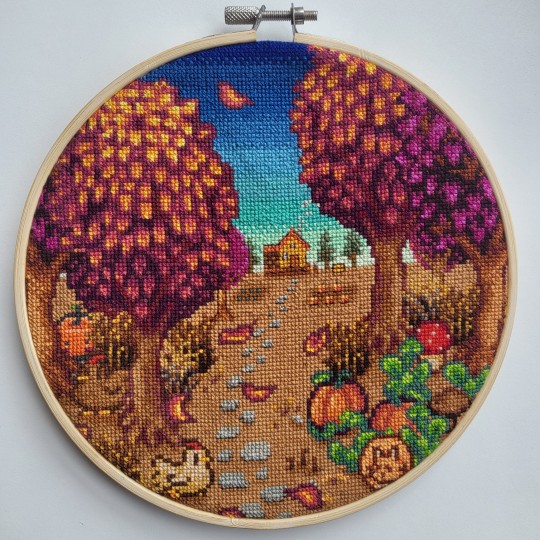
it's missing some backstitching because i couldn't for the life of me see it on the pattern and i laced it into the hoop before i realised but i'm counting it as a finish ok. ok.
pattern is autumn in the alley by fancyfoxglove
1K notes
·
View notes
Text
People severely overestimate the amount of work that is done by machines generally, but maybe especially when it comes to clothing. If you were to sew your own pants, you'd probably consider them handmade - and you've done nearly the same thing as someone making them in the factory. They just have more powerful sewing machines, and some parts are cut with die instead of by hands.
There's a very cool project that aims to show the amount of labour that goes into a piece - it's called the Human Touch Project. They reconstruct commercially available clothes while having ink and fabric paint on their hands so each time they touch the garment while remaking it, they stain it, visually representing the human labour that went into creating each piece.

"crochet can't be made by machines" went from being a cool fun fact to being a call to action of "so if you see mass manufactured crochet in Target, that was made by a person and they were underpaid and you should boycott it" which is true, it was made by a person, but EVERY item of clothing you own (that you did not purchase from a company using ethical labor) was made by a person being underpaid (at *best*.)
Sewing machines are operated by *people*. Knitting machines are operated by *people*. Yes lots of the process is automated but you cannot tell a machine "make me a t-shirt" or "make me a knit cardigan".
Higher awareness of fast fashion, and the true human labor and abuse behind it, is GREAT, but let's not pretend that the crochet hat in target is THE problem. Every article of clothing in target is the problem. "All clothes are made by people" is the jumping off point here into understanding this issue it's not just crochet it's the whole thing ahhhhHHHHHHHHHH
28K notes
·
View notes
Text
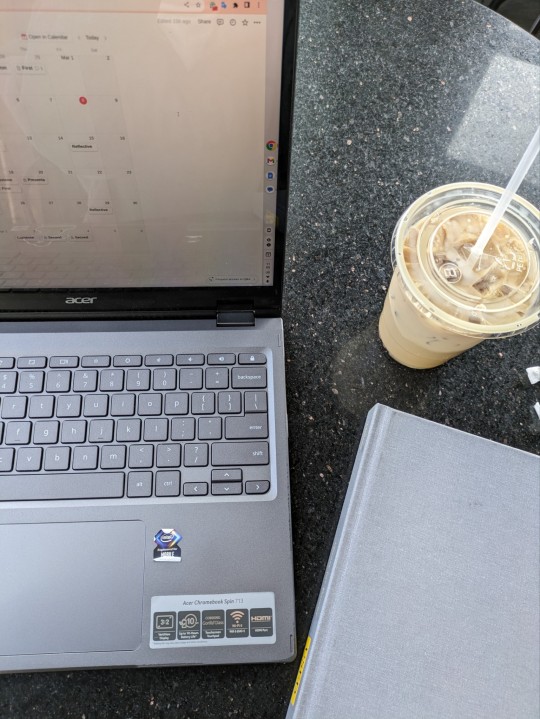

finding new coffee shops to work in!
goals: finish case study, apply to some internships
🎧 listening: coffee - bts 🎶
900 notes
·
View notes
Note
What's your IG, if you don't mind me asking? I loved your addition to that post about art, knitting etc. as purely personal hobbies :D Keep it up!
aww thank you ! i've spent a lot of time thinking about the topic the last few days, also in relation to generative AI and what that means for human creativity.
i have two seperate accounts as the art one is part of a larger (art) project about the music i listened to as a teen. For knitting you can find me with the handle tricosui, for the art account it's tollwuetend :)
3 notes
·
View notes
Text
capitalism sees people two ways - either as a consumer, or as a worker. having a hobby and making things yourself, creating, without a profit motive is unthinkable - either your hobby is consuming (collecting, but also watching blockbuster movies, buying bestseller books), or it is a "side hustle". There's no place for creative expression or just plain fun. You need either to buy or sell.
Since starting an art account on instagram, i constantly get this type of content recommended, the few comments and messages I get are bots asking me if I sell my art (or even worse, if i want to turn my art into nfts). There's no social media anymore, its just marketplaces where individuals are either isolated, or forced to turn themselves into personal brands.
And this slowly but surely seeps into my personal life as well. When I tell people that I knit my own garments, they always ask me if I sell them. And when I say now, they tell me that I should.
"top ten ways to improve your art!" "tips for small artists to get more reach" "how to improve this person's art" "here are some industry-standard art programs to use" what if all of you just died
3K notes
·
View notes
Text
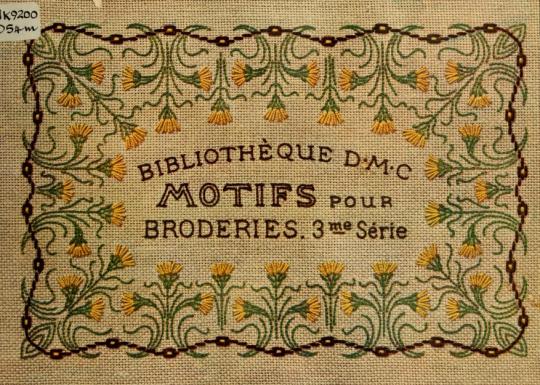

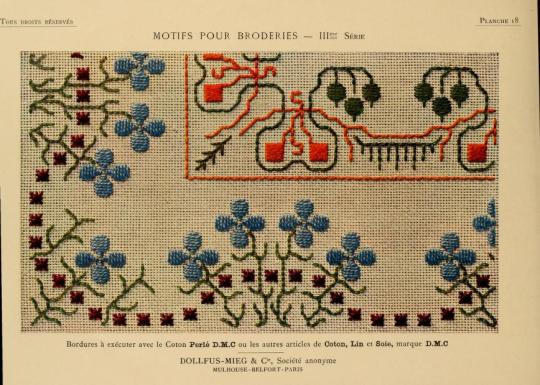

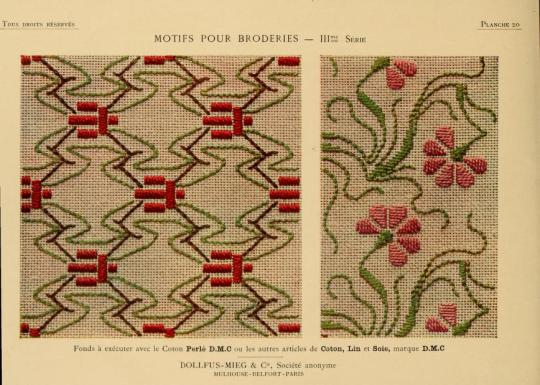


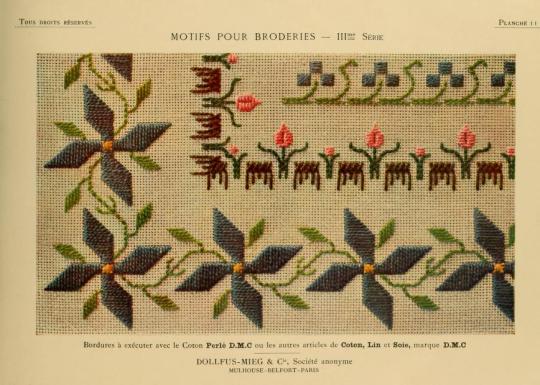


Embroidery motifs (1900) by Th. de Dillmont.
Published by Dollfus, Mieg & Cie (DMC).
Sterling and Francine Clark Art Institute Library.
archive.org
898 notes
·
View notes
Text
It looks great !! happy that it worked out :)
Today!!!! Is the day that I seam!!
50 notes
·
View notes
Text
I finished sewing in the last button a whopping six minutes before we were due to leave for our Christmas dinner (I would have worn it even if it didn't have all the buttons) and have been living in it ever since.




4K notes
·
View notes